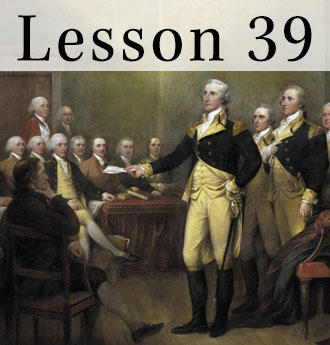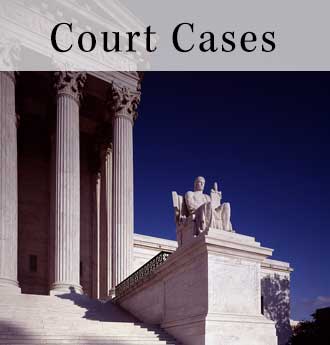Lesson 39: What Does Returning to Fundamental Principles Mean?
The case summaries below were provided by Oyez and licensed under the Creative Commons Attribution-NonCommercial 4.0 International License. Please visit Oyez.org for more case summaries.
United States v. Carolene Products (1938)
Facts of the case:
A 1923 act of Congress banned the interstate shipment of "filled milk" (milk with skimmed milk and vegetable oil added). A manufacturer, indicted for shipping filled milk, challenged the law.
Case Question:
Does the law violate the commerce power granted to Congress in Article I, Section 8 and the due process clause of the Fifth Amendment?
Case Conclusion:
No. The Court upheld the act. In this otherwise unremarkable case, the Court planted the seeds for a new jurisprudence in a footnote to Stone's opinion for the Court. Here Stone gives a presumption of constitutionality to economic regulation. The Court would no longer substitute its views on economic policy for the views of Congress. Stone went further in footnote four by cautiously asserting that certain types of legislation might not merit deference toward constitutional validity. The most controversial element in the footnote was the suggestion that prejudice directed against discrete and insular minorities may call for "more searching judicial inquiry," establishing the rational basis test and the strict scrutiny standard of review. Strict scrutiny would not be used until Korematsu v. U.S. in 1944.
Citation:
The Oyez Project, United States v. Carolene Products Co. 304 U.S. 144 (1938)
Link to case: https://www.oyez.org/cases/1900-1940/304us144
Planned Parenthood v. Casey (1992)
Facts of the case:
The Pennsylvania legislature amended its abortion control law in 1988 and 1989. Among the new provisions, the law required informed consent and a 24 hour waiting period prior to the procedure. A minor seeking an abortion required the consent of one parent (the law allows for a judicial bypass procedure). A married woman seeking an abortion had to indicate that she notified her husband of her intention to abort the fetus. These provisions were challenged by several abortion clinics and physicians. A federal appeals court upheld all the provisions except for the husband notification requirement.
Case Question:
Can a state require women who want an abortion to obtain informed consent, wait 24 hours, and, if minors, obtain parental consent, without violating their right to abortions as guaranteed by Roe v. Wade?
Case Conclusion:
Sometimes. In a bitter 5-to-4 decision, the Court again reaffirmed Roe, but it upheld most of the Pennsylvania provisions. For the first time, the justices imposed a new standard to determine the validity of laws restricting abortions. The new standard asks whether a state abortion regulation has the purpose or effect of imposing an "undue burden," which is defined as a "substantial obstacle in the path of a woman seeking an abortion before the fetus attains viability." Under this standard, the only provision to fail the undue-burden test was the husband notification requirement. The opinion for the Court was unique: It was crafted and authored by three justices.
Citation:
The Oyez Project, Planned Parenthood v. Casey, 505 U.S. 833 (1992)
Link to case: http://oyez.org/cases/1990-1999/1991/1991_91_744







